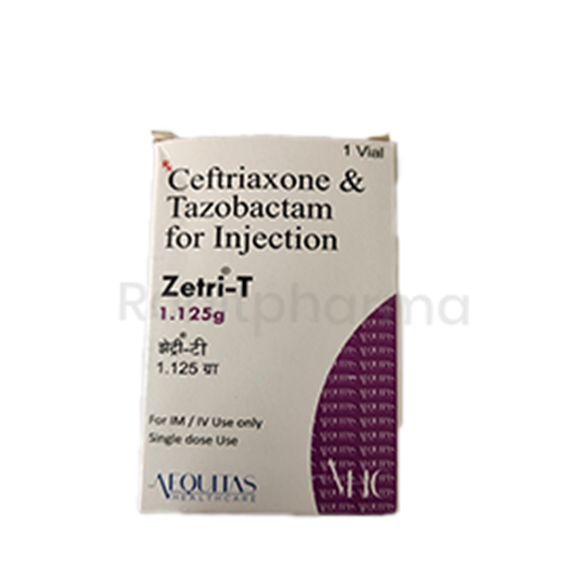Product Introduction
Zetri T is a combination medication developed by GH to tackle bacterial infections with efficiency. Its two active ingredients, Ceftriaxone and Tazobactam, work synergistically to provide a broad spectrum of antibacterial activity, making it effective against various pathogens. This combination helps in treating infections that are resistant to some common antibiotics, giving patients a powerful tool in overcoming serious infections.
Zetri T is commonly used in hospitals and healthcare facilities for treating infections such as pneumonia, urinary tract infections, and bloodstream infections, among others. Its broad spectrum and dual-action mechanism make it a reliable choice for healthcare professionals dealing with severe bacterial infections.
Uses of Zetri T (Ceftriaxone 1000mg + Tazobactam 125mg)
Zetri T is primarily indicated for:

- Serious Bacterial Infections – Treats infections like pneumonia, sepsis, and urinary tract infections.
- Intra-Abdominal Infections – Effective against infections occurring in the abdominal area.
- Skin and Soft Tissue Infections – Helps in treating infections that affect the skin and underlying tissues.
By combining Ceftriaxone's potent antibacterial activity and Tazobactam's ability to inhibit beta-lactamases, Zetri T enhances its effectiveness in treating infections caused by resistant bacteria.
Side Effects of Zetri T (Ceftriaxone 1000mg + Tazobactam 125mg)
Like any medication, Zetri T may cause side effects, although not everyone will experience them. Some common side effects include:
- Allergic reactions (rash, itching, swelling)
- Diarrhea
- Nausea or vomiting
- Pain or irritation at the injection site
- Headache
Less Common Side Effects
Some less common but more serious side effects may include:
- Clostridium difficile-associated diarrhea
- Liver dysfunction
- Blood cell count changes (e.g., low white blood cells)
- Kidney dysfunction
We are pleased to offer you the healthy.
Zetri T (Ceftriaxone + Tazobactam) is an essential medication for treating serious bacterial infections. It combines two powerful drugs to provide a comprehensive solution to a wide range of bacterial infections, helping patients recover quickly and effectively.
- Zetri T is typically administered through an intravenous (IV) injection or infusion in a healthcare setting.
- The dosage and frequency will depend on the type and severity of the infection being treated.
- Follow the doctor's instructions and ensure the medication is administered as prescribed.
- Avoid self-administration unless explicitly instructed by a healthcare provider.
Zetri T combines Ceftriaxone, a broad-spectrum antibiotic, with Tazobactam, a beta-lactamase inhibitor. Ceftriaxone works by interfering with bacterial cell wall synthesis, while Tazobactam protects Ceftriaxone from breakdown by beta-lactamase enzymes. Together, they effectively target and kill a wide range of bacteria, including resistant strains.
- Broad-spectrum antibiotic for treating serious infections.
- Effective against antibiotic-resistant bacteria.
- Helps reduce the risk of complications from severe infections.
- Fast-acting treatment administered in healthcare settings for quick relief.
- Zetri T should be used with caution in patients with kidney or liver problems.
- Inform your doctor if you have a history of allergic reactions to antibiotics.
- Ensure proper hydration during treatment to support kidney function.
- Regular monitoring of liver and kidney function may be necessary during treatment.

